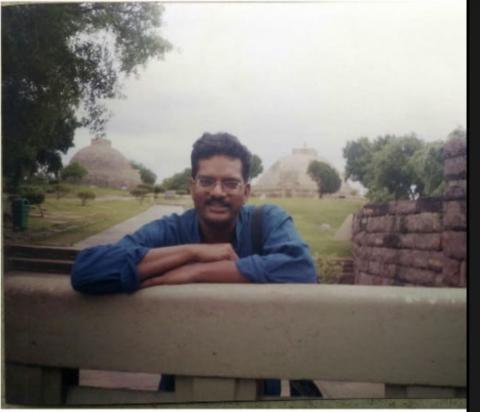E. Lec. (23): Travel Poetry and More

The Department of English organized the twenty-third in its series of virtual Enrichment Lectures on December 09, 2021, with Dr. Brian Mendonca from Carmel College, Goa (India), on “Travel Poetry and More.”
Dr. Mendonca began the lecture with an anecdote of a witty wordplay using which he talked of the necessity of contriving our idioms. Being a teacher, he emphasized the need to inculcate the sensibility of creation and creating in students; how poetry can be extracted out of the grandeur of one’s milieu. He further described how crucial it is to write ‘poetry connected with the land'. Since he had planned to present his poetry inspired by, and written in Rajasthan, he shared with the students how writing outside of Goa helps him in achieving a certain form of objectivity. Embossing the importance of poetry, stated as to how it connects us with deeper terrains of history than any other genre.
Thereafter, he moved on to ‘unpacking’ Travel Poetry by splitting the words to elaborate on how their fusion proliferates the meaning & how their attributes come together to create a beautiful idiom. He called his collection ‘poems in transit.’ Giving us a brief insight into the travel writing section of his university featuring works of Al Biruni, Mark Twain, Che Guevara, Elisabeth Bumiller, Rahul Sankrityayan, Ibn Battuta, Nahid Gandhi, and the like, he brought attention to the lack of representation travel poetry suffers in syllabi across universities. He also encouraged students to understand that writing travel poetry is the solution to this issue. He then acquainted the attendees to his body of work which includes but isn’t limited to thirteen poems published by The Sahitya Akademi, New Delhi, and two other anthologies, Last Bus to Vasco (2006) and ‘A Peace of India: Poems in Transit’ (2011), both of which are self-published. Through this, he focused on the true purpose of poetry, how it is to be written for oneself and doesn’t need any ornamentation or flamboyancy to hold gravitas.
Dr. Mendonca then broke the ice with the audience via a brief interaction with the students and Dr. H. S. Chandalia from the Central University of Haryana who also graced the lecture with his presence. By citing Wordsworth, W. B. Yeats and Pablo Neruda, Prof. Mendonca mentioned the two prerequisites of creation in the field, which are a) to travel and b) to describe, yet he also made sure to include the capabilities of a poet’s fantasy. Elaborating on the urgent need to showcase the beauty and integrity of India, he talked of his love for poetry originating from his country. Through a presentation of his poetry, he brought in the importance of research and how an understanding of the culture is essential to the craft. This can also be observed in his poetry as he prefers to give the readers context of the poem through brief footnotes. He also believes that poems don’t need to be lengthy to be effective; kinesthetic and sensory inputs, liquefied in the form of language strengthen a work. His poems are a celebration of the history, culture, architecture, and grandeur of the city he visits and resides in; he somehow visualizes for the readers the scent of the city. He documents the vignettes of the quotidian experiences and the Magnus of the mundane.
Bringing the lecture to a close, he talked of how the arenas being documented rely on the poet for their account in history. He also emphasized that reading acts as the fuel of creation. Following this, the floor was opened to the attendees where they shared their work, in both Hindi and English on topics of liminality and the connotations of a ‘journey’. The contributions and significance of photo essays in prompting Travel writing were also discussed vis-à-vis personal experiences. The lecture came to an end as students and faculty members expressed their gratitude and admiration for the poetic and professorial sensibility of Dr. Mendonca.

